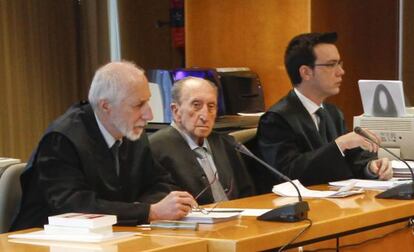Lawyer who called the homeless "filth" won't be charged for remarks at trial
Prosecutors must determine whether media statements constitute a crime


A controversial 90-year-old defense lawyer, who said publicly that homeless people "are not humans but a cancer on society, and should be cut out," won't be prosecuted for his inflammatory remarks, a Madrid prosecutor said last week.
One of the reasons why charges won't be brought against Ángel Pelluz is because the brief he filed in a criminal case that contained his xenophobic statements, which he read in open court, was not signed by him.
Nevertheless, the Madrid regional High Court has rejected a petition by the prosecutor to strike remarks from the court record, and instead ordered a lower court to investigate whether Pelluz could be charged with inciting violence.
The attorney, with 61 years of experience, shocked prosecutors and the bench last month during a trial against four suspected neo-Nazis - who were charged with violently assaulting a homeless man in 2009 - when he read from a written statement in court. "Vagrancy is not recognized in our Magna Carta," Pelluz said. "The occupation of public space by someone who does not have a dignified existence is a cause of rejection in others that obey the law. Vagrancy, the desire to do nothing, the act of being a parasite on decency, gives rise to repulsion."
They are not humans. They don't work; they are a cancer on society"
During a break in the trial, Pelluz then told reporters: "I've seen local residents moving cardboard and these people, with lice, to get into their homes. They are not humans. They have not worked in their life; they are a cancer on society. If I have cancer, the doctor wouldn't pussyfoot around; he'd cut it out, and this is the same."
The victim in the case, Rafael Santamaría, never fully recovered from the attack on the night of August 23, 2009 as he slept in a photo booth in Madrid. The four men were sentenced to various terms, of up to 10 years.
According to a provincial High Court ruling, Pelluz filed another redacted brief before the conclusion of the trial but still argued that the victim was to blame for the assault, because "nobody wants to see dirt, lice or rats at the front door."
While the High Court has sided with the prosecutors that the comments are inadmissible in the court proceedings, his verbal statements may be another question. The court said that it would not have allowed Pelluz to correct his written brief, and asked Madrid's chief prosecutor Eduardo Esteban to determine whether action can be taken for his public remarks. The ruling states that his statements to the press could be considered "more derogatory" but they cannot be held against him in the trial proceedings because they were not made in open court.
"We are studying all the statements he made to some media outlets and, if we believe that a crime was committed, then we will file charges," Esteban said. "If there is no basis to file charges, we will pass the matter to the Bar Association for sanctions."
Last month in an interview with EL PAÍS, Pelluz said: "My clients didn't do anything, they were simply passers-by. What I want to say is that there was prior provocation, the presence of this person in the street. Nobody wants to walk down Gran Vía shoving shoeless people aside. Shit has always been cleaned up."
A spokesman for the Bar Association said that the lawyers' group was waiting for the provincial High Court's ruling to determine whether to pass the case to a disciplinary committee to determine whether to start proceedings against Pelluz.
While the entire matter is being played out, the nonagenarian is recovering from an operation that he underwent several days ago.
Tu suscripción se está usando en otro dispositivo
¿Quieres añadir otro usuario a tu suscripción?
Si continúas leyendo en este dispositivo, no se podrá leer en el otro.
FlechaTu suscripción se está usando en otro dispositivo y solo puedes acceder a EL PAÍS desde un dispositivo a la vez.
Si quieres compartir tu cuenta, cambia tu suscripción a la modalidad Premium, así podrás añadir otro usuario. Cada uno accederá con su propia cuenta de email, lo que os permitirá personalizar vuestra experiencia en EL PAÍS.
¿Tienes una suscripción de empresa? Accede aquí para contratar más cuentas.
En el caso de no saber quién está usando tu cuenta, te recomendamos cambiar tu contraseña aquí.
Si decides continuar compartiendo tu cuenta, este mensaje se mostrará en tu dispositivo y en el de la otra persona que está usando tu cuenta de forma indefinida, afectando a tu experiencia de lectura. Puedes consultar aquí los términos y condiciones de la suscripción digital.








































